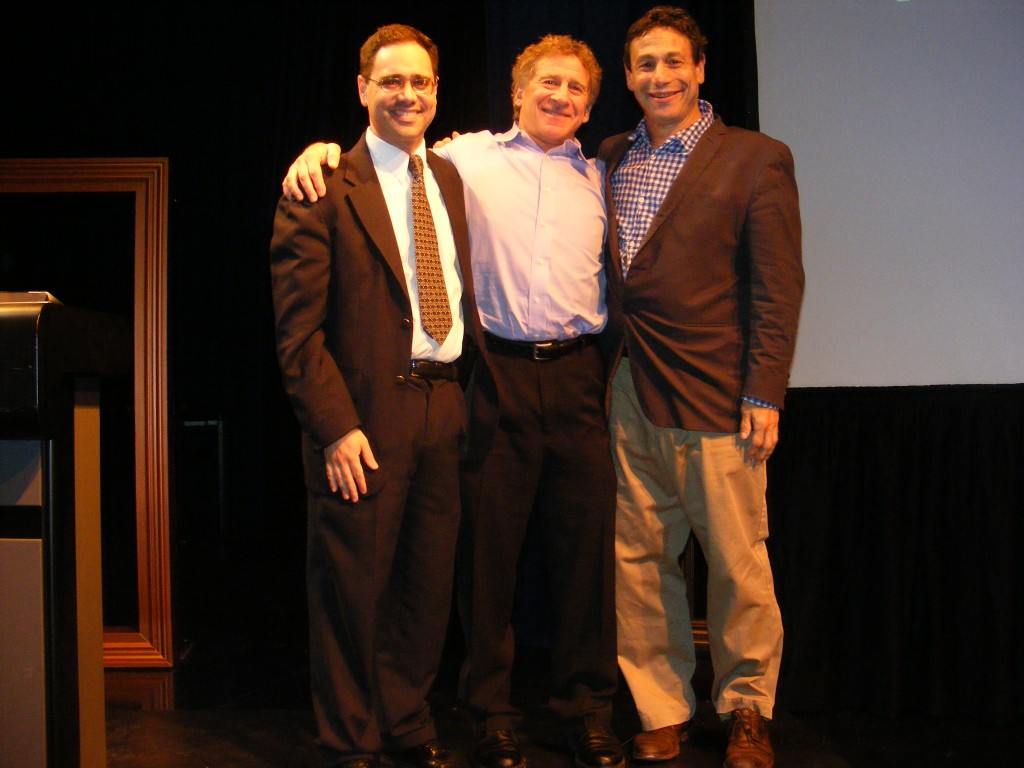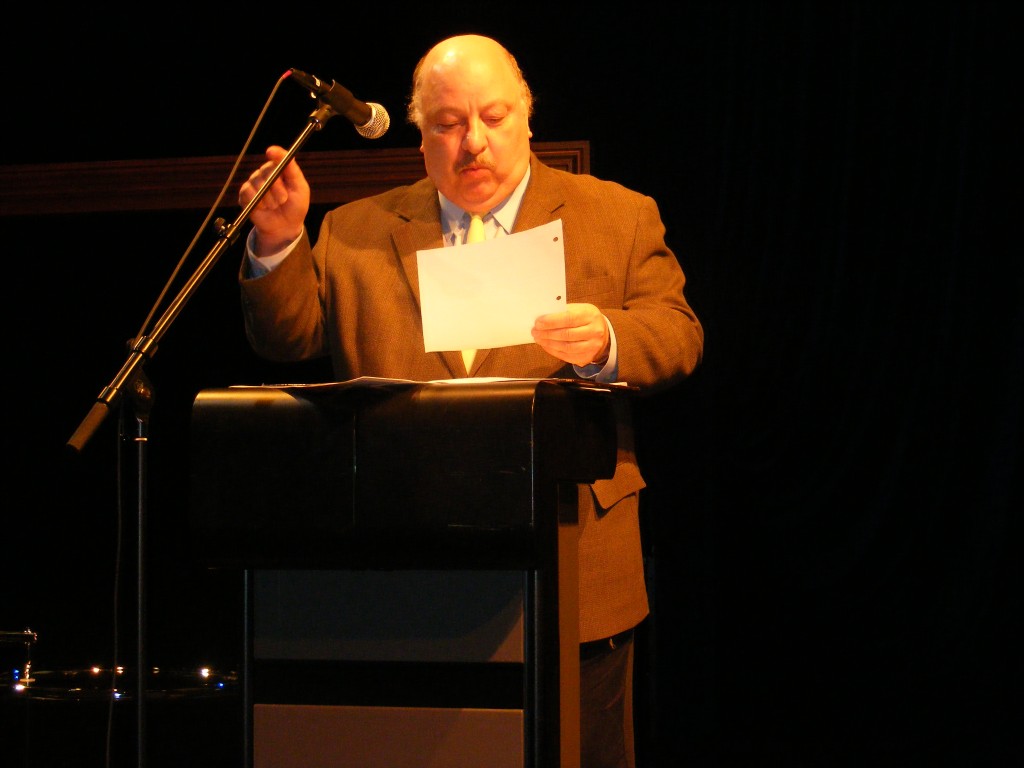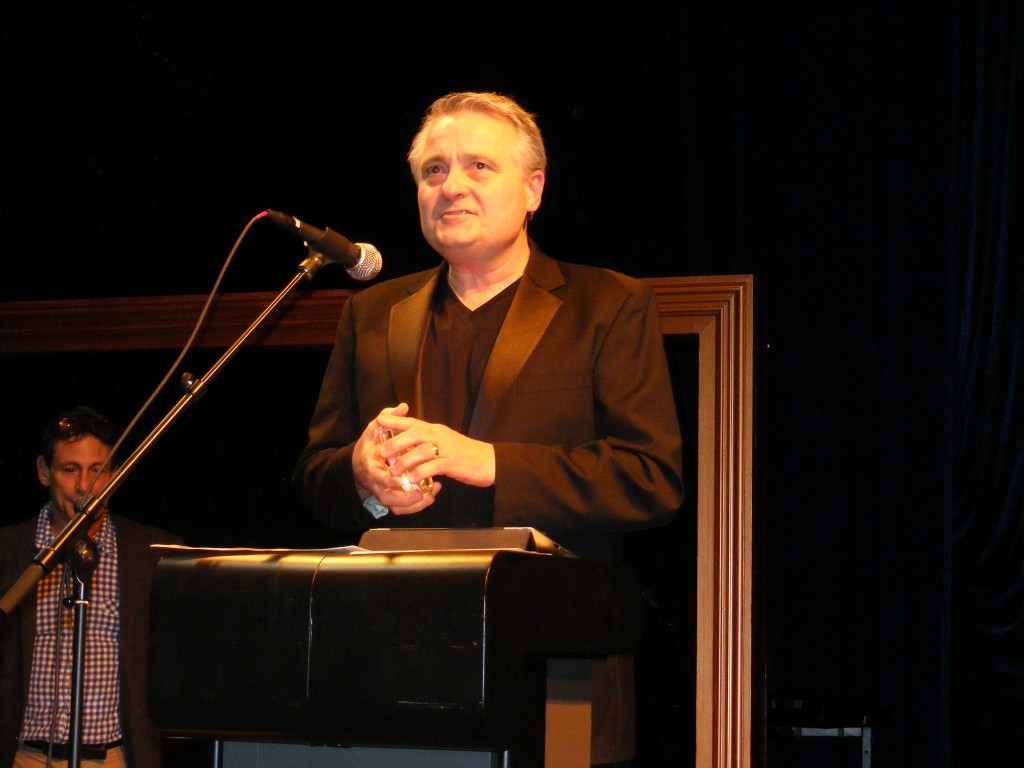
Josh Borenstein, Jerry Meyer and Gordon Edelstein at the Long Wharf 2012-13 season announcement festivities Monday night.
The Long Wharf had their big 2012-13 season announcement last night at a pizza-studded press conference/subscriber event in the theater’s Stage II space.
Long Wharf was the last major theater in the state to unveil its 2012-13 slate. Seems like there was some last-minute scheduling involved, but the LWT also reports that subscription renewals were going great so far without the boost of subscribers actually knowing what shows they’d be seeing. So there was no great hurry to announce. Taking their time has one happy result: Look! No TBA slots on the schedule!
The attendees were tipped to all six titles in the season—two world premieres, one “near-premiere,” two recent well-known New York hits and the first Long Wharf production of a writer who’s been a regional theater staple elsewhere for several decades now.
Star names were dangled: Judith Ivey and John Douglas Thompson.
We also know who’s directing all but one of the six plays in the 2012-13 season. Long Wharf Artistic Director Gordon Edelstein is directing three of them and Eric Ting is directing two. Edelstein and Ting assured me that neither of them would be directing the other one, God of Carnage—give someone else a shot!
Here’s the season, with my own annotations plus quotes from last night’s live announcements. The Long Wharf’s own descriptions are here: http://www.longwharf.org/2012-2013-season
Oct. through Nov. 4: While renovations are being finished on the Long Wharf mainstage, the season opens in Stage II with the one-man, two-character show Satchmo at the Waldorf, a new play by Louis Armstrong biographer and Wall Street Journal theater critic Terry Teachout.
Satchmo at the Waldorf sounds like it’s in line with recent Long Wharf offerings such as Ella and Lady Day at Emerson’s Bar & Grill. But two big things make it different: Satchmo at the Waterfront is a world premiere, and it doesn’t have a live band onstage. Yes, it’s a biographical portrait of Louis Armstrong, but the trick is not that it’s a one-man show, with the same actor playing both Louis Armstrong and his white, Jewish manager Joe Glaser. The show stars John Douglas Thompson, now a well-known New York actor (Flavius opposite Denzel Washington’s Brutus in Julius Caesar, LeBret opposite Kevin Kline’s Cyrano, opposite Kate Mulgrew in Antony and Cleopatra, the title roles in Othello and The Emperor Jones) but one who came up through East Coast regional theater stints with Trinity Rep, the ART and Shakespeare and Company.
In announcing the show, Edelstein mentioned that Terry Teachout “had to recuse himself from reviewing us for a while,” an interesting ethical aside to the critic’s newfound interest in playwriting. Satchmo at the Waldorf is drawn from Teachout’s book Pops: A Life of Louis Armstrong, published in 2009. It’s the writer’s first play, though he has done a couple of opera libretti previously.
Nov. 28-Dec. 23: The first mainstage show of the season is Yasmina Reza’s God of Carnage, a rare example of a play coming to the Long Wharf less than five years after its Broadway success. The Long Wharf prefers to have plays go in the other direction—introduced in New Haven then sent to New York—but this year has included TWO recent New York hits on its sched. Hartford’s TheaterWorks, which (being 50 miles further from NYC) commonly does Connecticut premieres of noteworthy New York hits, did God of Carnage two years ago. Edelstein also noted last night that God of Carnage was “recently made into a film that I hope none of you saw.” Certainly it’s a show which should resonate with Long Wharf subscribers—it’s about defensive, bickering parents standing up for their kids and infantilizing themselves in the process. It’s the first Yasmina Reza play to be done at the Long Wharf, but the theater has a history with her regular translator, Christopher Hampton, who’s quite the playwright himself. Gordon Edelstein did a brilliant production of Hampton’s The Philanthropist at Long Wharf in 1992.
Jan. 9 through Feb. 10, 2013: Just last week I noticed that Laura Jacqmin’s bio blurb regarding the upcoming reading of her script Two Lakes, Two Rivers at the Eugene O’Neill Theatre’s National Playwrights Conference in July mentioned that “her work has been produced and developed by Long Wharf Theatre. Well, that made me go “Huh?,” since I wasn’t aware of that connection, though I had just seen Jacqmin’s Hero Dad done as one of the Ten Minute Plays at the 2012 Humana Festival in Kentucky. She also turns out to be a Yale grad.
January Joiner is what that blurb is talking about. It was workshopped in New York last month, and the cast from that workshop presented a scene from this so-called “Weight Loss Horror Comedy” last night. It consisted of three overweight characters working out at a health club in Florida, wondering why there were so few clients there, and why a vending machine was spewing out knives, and why anybody would ever choose to live in Florida anyway.
When Gordon Edelstein announced that January Joiner would be “next year’s global health play,” it got a big laugh, which led him to add “I didn’t mean that as a joke.” Every year, the theater holds a science- or medicine-based panel discussion/seminar around the themes of one of the plays that season, and this year it’s January Joiner. I guess it was either that or a forced chat about Ritalin in reference to God of Carnage, or the nutritional aspects of raw sheep meat in…
Feb. 13-March 10, 2013: Curse of the Starving Class. Gordon Edelstein tells me he’s directed Sam Shepard plays before (though not this one). But Long Wharf is virginal territory for the famous Off Broadway playwright. Not that New Haveners are unaccustomed: Yale Rep did Curse of the Starving Class in 2000, Buried Child in 1979 and Suicide in B-Flat in 1976.
There’s even a rich history of UNproduced Shepard productions at Yale: the Yale Cabaret scuttled a planned 1970s staging of Operation: Sidewinder when student unrest over its themes became threatening, and a ready-to-go Cabaret production of The Tooth of Crime a few years ago was shut down because the rights had been granted for a New York revival.
Curse of the Starving Class has a wilder local connection than that Yale Rep production. The play had its world premiere overseas, at London’s Royal Court Theatre in 1977. In its cast was Ray Hassett, then a steadily working stage and film actor and now the New Haven Police Lieutenant in charge of the substation at the corner of Edgewood Avenue and Day Street. The Village Voice gave Curse of the Starving Class an Obie Award as Best New Play despite the judges having only read it and not having seen it staged yet. The play, a tragicomedy about the new underclass created by farm failures in the mid-20th century heartlands, has never failed to excite strong passions, not least for the script’s requirement that a live sheep appear onstage. (It’s a requirement which Edelstein says he intends to honor. Baaaaaaaa!) Also in the cast: Judith Ivey, a Long Wharf superstar after her star turns in Glass Menagerie and Shirley Valentine, both directed by Edelstein.
March 27-April 21, 2013: Ride the Tiger is a new history-based drama by William Mastrosimone, a regional theater stalwart whose hits include Extremities and The Woolgatherer. Long Wharf did his Shivaree in 1984. Mastrosimone himself explained last night that he wrote Ride the Tiger because, while he was writing the screenplay for the miniseries Sinatra, Frank Sinatra himself told the playwright that “the JFK assassination was a mob hit.” The miniseries producers were skittish when threatened with a lawsuit, and minimized the accusation. So Mastrosimone held onto the material, waiting for “the right moment at the right place with the right director.” Edelstein dubs the Long Wharf production a “near premiere,” since an earlier version of the script was staged under a different title. (That would be Dirty Business, done at Florida Stage in 2008.) Mastrosimone described the plot as “basically a Faustian bargain soil on American soil,” and then read a breezy, bristling, exposition-filled scene between mobster Sam Giancana and Sinatra in which the singer tries to swing covert organized-crime support for struggling Democratic presidential candidate John F. Kennedy.
May 8-June 2: The final play of Long Wharf’s 2012-13 season is an even more recent hit than God of Carnage. Bruce Norris’ race-based Chicago drama is currently nominated for a Best Play Tony Award and has already won the 2011 Pulitzer Prize for Drama. (The play’s New York premiere was in early 2010 at Playwrights Horizons.) “Ordinarily, as you know,” Gordon Edelstein explained last night, “we tend not to do the shows running in New York. We consider outselves kind of a regional theater, kind of an Off Broadway theater. … But we believe in this play. It pertains to this community. It’s a play about race, it’s a play about real estate and it’s a play about neighborhoods, ladies and gentlemen.” The concept seems to be that Long Wharf is bringing you Clybourne Park not because its comfortable and popular but because it’s confrontational and close-to-home. All right then.
Clybourne Park was inspired in part by Bruce Norris’ reaction to the classic play A Raisin in the Sun by Lorraine Hansberry. That play, serendipitously, will be part of the current season at Westport Country Playhouse, playing Oct. 9-Nov. 3. The theaters are planning cross-promotional events linking the dramas.
Monday’s press conference had several other elements, not least of them the scads of post-event pizza cooked fresh in the Long Wharf parking lot by the Big Green Pizza Truck.
Prior to the season announcement, the Long Wharf presented its annual Founders Awards, which really gave the event a family feel. Among the honorees were two of the theater’s longest-serving employees, accountant Jerome Percoraro, set-painter Keith Hyatte, “live event technologists” HB Group and longtime Long Wharf board member Jerome Meyer.
Hyatte, who joined the Long Wharf in 1976 and became its “scenic charge artist” in 1982, confessed “I came to Long Wharf Theatre straight out of college. I didn’t even know Yale was here.”
Percoraro, the Long Wharf’s longest-serving full-time staff member, admitted “I seriously had no idea of staying this long,” but “where else in the accounting world can you ever discuss soap operas with Arthur Miller?” A representative from HB Group, which has been helping the theater with technical equipment and projection apparatus (not just for shows such as Agnes Under the Big Top but in the Long Wharf lobby) seemed daunted to be honored alongside such entrenched employees. The final honoree, Jerry Meyer, was his usual selfless self, spending his entire time at the podium praising the work of Hyatte and Percoraro.
A new award, the Claire Tow Emerging Artist Award (named for the same generous Long Wharf patron and past board member after whom the theater’s mainstage has just been named) was presented to Gabriel Kahane, who couldn’t attend the ceremonies—last year at this same event, Kahane presented solo renditions of tunes from February House, the musical he co-wrote with Seth Bockley.
Others who’d been expected at the festivities but couldn’t come: Satchmo playwright Terry Teachout, whose mother passed away last weekend, and Judith Ivey, who’d hoped to present a reading from Curse of the Starving Class.
There was also a happy business announcement: Managing Director Joshua Borenstein noted that the theater had raised 80 percent of its goal for the already-begun mainstage renovations.
The season announcement event has become a important part of the late end of the Long Wharf season, especially for those who can’t afford to attend the theater’s annual gala celebrations. This one had tastes of new scripts and a real theater-family feel, capped off, as Gordon Edelstein suggested, with something no family gathering should be without: a feast.
This information should be plenty to fill you up and hold you until the fall.



